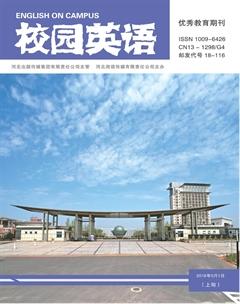The Application of Euphemism in International Business Negotiations from the Perspective of Politeness Principle
刘晓双
【Abstract】Business negotiation is an active course of different economic entities. This paper mainly focuses on the application of the six maxims of Politeness Principle and its pragmatic politeness strategies in international business negotiations.
【Key words】Business negotiations; euphemism; Politeness Principle
For the common goal and interest, negotiators have to cooperate with each other to prevent the negotiation from going to extreme and it is necessary for negotiators to create a friendly and harmonious atmosphere.
The six Maxims in international business negotiations
1. Tact Maxim
Tact Maxim refers to minimize the expression of beliefs which imply cost to other; maximize the expression of beliefs which imply benefit to other. In practice, negotiator should take the other parts position, using “other attitude” rather than “self-attitude”.
Example:
a. Im delighted to send you our latest catalogue and we wish to draw your attention to a special offer we have made in it.
b. Youll be particularly interested in a special offer on page 5 of the latest catalogue enclosed, which you requested in your letter of May 20.
Sentence a uses a we-attitude, putting the other part as a sub-important position. Sentence b uses a you-attitude, trying best to make the other parts benefit obviously.
2. Generosity Maxim
Generosity Maxim refers to minimize the expression of beliefs that express or imply benefit to self; maximize the expression of beliefs that express or imply cost to self. When it applies to international business negotiations, it means to use “other attitude” more, and uses “self attitude” less.
Example:
a. We are sending the documents to you by Air Express.
b. We are rushing the documents to you by Air Express.
There is nothing wrong in sentence a but in sentence b, it can be obviously found that the speaker maximize cost to himself or herself out of the consideration of the other part.
3. Approbation Maxim
Approbation Maxim refers to minimize the expression of beliefs which express dispraises of other; maximize the expression of beliefs which express approval of other.
Example:
We are most appreciative of your full cooperation in making our discussion a success.
To create a more harmonious atmosphere, the sentence fully indicates one part should sincerely express the appreciation and gratefulness in business cooperation.
4. Modesty Maxim
Modesty Maxim refers to minimize the expression of praise of self; maximize the expression of dispraise of self. In business activities, it is important to give a realistic judgment for ones own company, products and service. Either exaggerate or blow ones own horn is not appropriate.
Example:
a. The product is absolutely the best on the market.
b. The product is the best one we can supply.
Obviously, sentence a is too exaggerate while sentence b is modest and appropriate.
5. Agreement Maxim
Agreement Maxim refers to minimize the expression of disagreement between self and other; maximize the expression of agreement between self and other.
Example:
We understand that the lateness of the payment might have been exceptional .As we should like to keep you supplied, we shall hold back your order for 15 days while we await your reply.
In the sentence, understanding is given to the part who delays the payment.
6. Sympathy Maxim
Sympathy Maxim refers to minimize antipathy between self and other; maximize sympathy between self and other.
Example:
We feel very regretful that we are not in a position to accept your offer.
If one part notices their mistakes before the other part do, the best thing to do is to offer an apology. This will be easier to get an understanding of the client and improve the business credit of the company and establish a good image.
Conclusion
Putting correctly and flexibility Politeness Principle in application, it will help business English negotiations to get a better effect and serve our countries international trades and culture communications at a better level.
References:
[1]Enright,D.J.1985.Fair of Speech-The Uses of Euphemism[M].New York:Oxford University Press.
[2]Goffman,E.1967.Interaction ritual:essays in face-to-face behavior[M].New Brunswick:Aldine Transaction.
[3]Grice,H.P.Logic and conversation[A].In P.Cole & J.Morgan Studies in Syntax and Semantics III:Speech Acts[C].New York:Academic Press.

